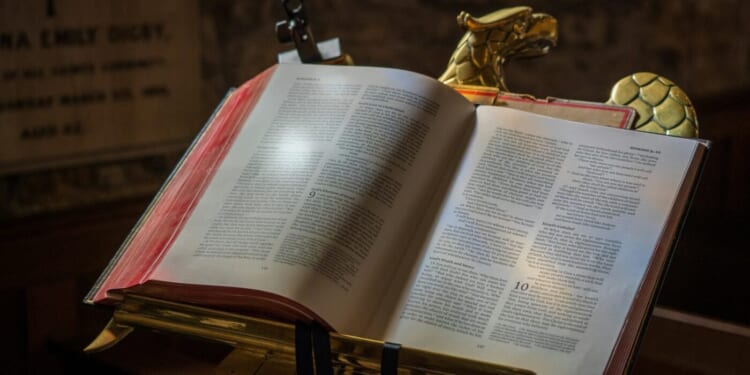A lawyer’s start
Years ago, I almost died from cancer and a massive, nearly-simultaneous heart attack. As I recovered, I had one nagging “bucket list” thought: I had never actually read the books I was named after. So I ordered a box of Bibles—plural, since there are so many different ones—and began reading. One question led to another until I found myself deeply immersed in the Case for Christianity: evaluating Christian claims like a court case. What does the evidence say? Are the witnesses reliable? Does the testimony hang together? Did Jesus truly rise from the dead?
After much reading and a long argument with myself, I reached a sober conclusion: a fair judge would rule that the best explanation of the evidence is that Christianity’s historical claims are true. In other words (ignoring for the moment all the philosophy involved), one would have to convert—and therefore I did so myself.
But along the way, that “box of Bibles” had raised some issues: Which Bible? Which books are the authentic Apostolic teachings? Those are not trivia questions: how we handle the canon—the list of books Christians call Scripture—can either help an honest skeptic move toward faith or quickly undermine the whole case.
In fact, those questions explain how a box of almost entirely Protestant Bibles started me down the road that leads to Rome, and the Catholic Church.
Honest standards
The basic task of Christian apologetics is to show we have good reasons to trust the sources that tell us about Jesus Christ—above all, the books of the New Testament. We appeal to things like early testimony, use in the Church, coherence with the rest of Scripture, and the witness of the Fathers. Different writers weigh those categories differently, but the aim is the same: show that belief is reasonable.
But some Protestants, eager to defend the faith, use one set of rules to authenticate the books they already accept, and a stricter set of rules to dismiss books they don’t—specifically the books Catholics call the Deuterocanon (or “Apocrypha,” to Protestants). To a skeptic trained to notice inconsistencies, that is an easily-spotted double standard.
A simple example
Consider Susanna, a short narrative connected to the book of Daniel in ancient Christian Bibles. Very early Christian writers testify that all the churches publicly read Susanna as Scripture. They knew it wasn’t in the Hebrew version some Jews were using, but they still read it. The details are fascinating, but the takeaway is straightforward: the earliest Christians we can hear clearly used, received, and testified (unanimously) to Susanna.
According to all the witnesses, for 400 years—at least sixteen generations (the same time period from the Pilgrims to us today)—“all the churches of Christ” (as Jerome says) and “every Church of Christ” (as Origen says) accepted Susanna as “the divine record handed down to the Churches by the Apostles and the deposit of the Holy Spirit” (as Rufinus says).
And, incidentally, what Jerome said to Rufinus is applicable to anyone else who claims Jerome supported the Jewish/Protestant canon: “I repeat what the Jews say against the Story of Susanna…the man who makes this a charge against me proves himself to be a fool and a slanderer; for I explained not what I thought but what they commonly say against us.” So sayeth Jerome: even he (the Father perhaps closest to the Protestant canon) joined “all the churches of Christ” in accepting Susanna.
Why this matters
Now, what follows from that? Simply that if you claim that the early Church’s acceptance authenticates the true Apostolic preaching, you inherit Susanna.
That conclusion seems to be well-understood by Catholics when arguing that Susanna should be accepted by modern Christians as Scripture.
But a second conclusion seems to be under-appreciated and under-emphasized:
For Protestants who claim that Susanna is not authentic Apostolic preaching, the early Church simply cannot be proof that Matthew, Mark, Luke, and John are the authentic Gospels of the true Disciples of Jesus Christ.
Pile up all the evidence you want for the Gospels, and it all amounts to the same thing: proof that the Gospels were (at best) as widely and universally accepted by the early Church as Susanna—which such Protestants themselves will tell you is not sufficient to prove that Susanna was Apostolic teaching.
In other words: in an evidence-based case, Christianity and the Deuterocanon are a package deal.
Why this helps when talking to atheists
Obviously, that’s a good point to make with Protestants when arguing over the correct Bible. But perhaps less obviously, it is also a good point when trying to convince an atheist to join us in the Church.
Pragmatically, a consistent approach does three things when talking to an interested skeptic:
- It lowers defenses. Otherwise, people stop listening when they feel a game is rigged.
- It strengthens the case for Christ. It eliminates a major flaw in the foundation of the case (as preached by Protestants).
- It clarifies the real choice. Evidence is the foundation of everything that a skeptic is evaluating (“Is this really true?”), and the historical claims for Christianity are based on the same evidence as the Deuterocanon.
When Christian books asked me to weigh historical evidence for Jesus, I was willing. The evidence is compelling, and even once I saw the Protestant double standard, my focus just shifted away from Protestantism to other forms of Christianity as the only possible truths.
In the end, what kept me reading about Catholicism was consistency. Consistent, logical, philosophically sound religion was a concept I had never imagined. It was the consistent application of the same rules and standards that led me to see Catholicism as the only possible alternative to atheism as the whole truth—and then ultimately as the whole truth.
Author’s Note: Matthew Mark McWhorter is a retired corporate attorney and the author of Canon Crossfire: Does the Protestant Bible Blow Up the Case for Christianity? Read a free preview at CanonCrossfire.com.
Photo by Nick Fewings on Unsplash











